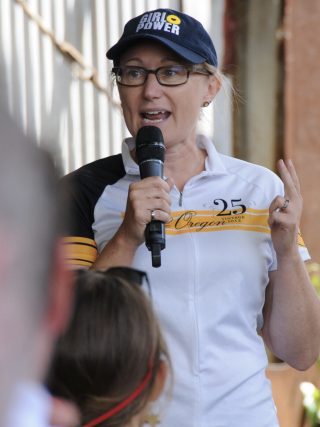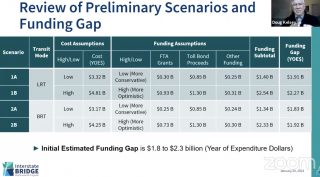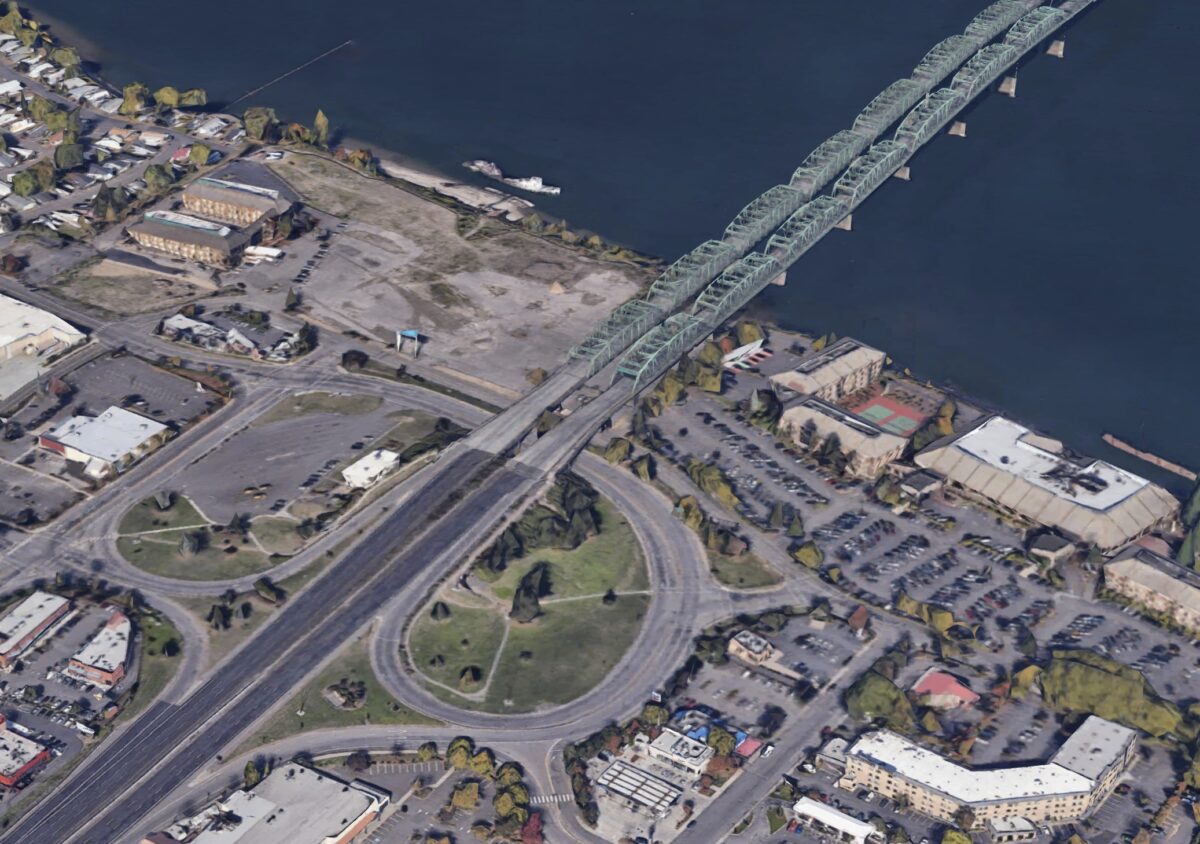The latest effort to built a new, wider freeway between Oregon and Washington is called the Interstate Bridge Replacement Program (IBRP). It’s been nearly seven years since the last effort (the Columbia River Crossing) died and project staff are once again barreling down the highway. While electeds and staff are giddy, at least one key elected official is urging restraint.
Last week the IBRP launched a slick new website and social media channels. At a meeting of the project’s bi-state Executive Steering Group (ESG) yesterday, Program Administrator Greg Johnson seemed downright excited. “I told you before we were walking fast. We’re going to start running at this point,” he beamed.
Johnson and other project backers are especially gung-ho because Washington lawmakers just introduced a $26 billion funding bill with $1 billion set aside for the IBRP — the only project to receive an earmark. “That’s billion with a ‘b’ dollars and we’re absolutely ecstatic about that,” said Vancouver Mayor Anne McEnerny-Ogle.
Advertisement
In a nod to this project’s size and import, the ESG is staffed by heavy-hitters in the transportation and political worlds on both sides of the river. DOT directors from both states, transit and port authority leaders. There are even bipartisan legislative committees in both Oregon and Washington assembled for the sole purpose of making the project happen.
Mayors from both cities are also on the ESG; at least that’s the plan. McEnerny-Ogle is already on board but for some reason Portland is yet to name a representative. Mayor Ted Wheeler sent his Chief of Staff Sonia Schmanski to the meeting yesterday. She said they haven’t figured out if it will be Wheeler or Portland Bureau of Transportation Commissioner Jo Ann Hardesty on the committee. It’s unclear if this is about scheduling or if it’s just delaying the inevitable: Hardesty and Wheeler must know this project is likely to be highly controversial.

(Photo: Jonathan Maus/BikePortland)
Metro President Lynn Peterson seems to grasp that fact very well. That’s probably because she has a few battle scars from the Columbia River Crossing. Peterson was Oregon Governor Kitzhaber’s transportation policy advisor in 2011 and went on to become head of the Washington Department of Transportation. Peterson was only at WashDOT for the tail-end of the CRC debacle but she’s been around local transportation politics for over 25 years.
After IBRP Administrator Johnson’s jovial “we’re running” comments at the outset of yesterday’s meeting, Peterson was quick to throw on some cold water. “While we want to see the bridge replaced, we want to see it done at a pace where everyone can be brought along and make sure we get consensus as we move forward,” she cautioned. And that was just the first of several remarks that show she’s playing it cautious so far.
At two key points in the meeting, Peterson warned ESG members of the perils of repeating mistakes from the past. Both warnings were related to how assumptions about design and cost might lead to an outcome that is too driving-centric (and therefore, controversial). “I think we really need to go back and look at those underlying traffic forecast models that we did because it will impact how we craft the ‘Purpose and Need’ [a reference to a required section of the federal NEPA process that will dictate which design alternatives can be studied].” Peterson is worried that faulty traffic projection data will lead to sharp criticism from advocates and stakeholders. “It’s really important to look back at the assumptions that were made back then [during the CRC process],” she added. “We had challenges to the basic underlying traffic forecasts and travel assumptions… we’re gonna get a lot of questions about that.”
Advertisement

At another point in the meeting Peterson raised a caution flag about cost estimates. The cost of the project was the straw that broke the back of the CRC when Washington lawmakers balked at paying their share ($450 million) of the estimated $3.4 billion project. In yesterday’s meeting, Peterson pressed project staff about how the highway portion of the project will influence cost estimates.
While the DOTs want everyone to think this is about replacing one bridge (because it makes the PR and politics easier), the project is also about expanding I-5 and building larger freeway ramps on both sides of the river. Despite the focus on the river crossing, non-bridge highway elements (which included not just more and wider lanes but three park-and-ride lots with a total of 2,900 new car spaces) of the CRC were estimated at about 40-45% of the total project cost.
Peterson seems to understand that the scope and cost of the non-bridge elements of this project will be pivotal to the project’s success — or failure.
In response to a funding chart presented to the ESG that showed a high and low estimate for transit costs (but not for the highway), Peterson said, “What I’d like to see going forward are practical design options for the highway portion and how that’s affecting the cost… I think, in order to be able to afford this… we need more options on the table than just having a high and low transit option. We’re going to need high and low highway options to pair with them.”
Just like last time around, we’ll be watching this project closely. Stay tuned for coverage as the process moves forward.
— Jonathan Maus: (503) 706-8804, @jonathan_maus on Twitter and jonathan@bikeportland.org
— Get our headlines delivered to your inbox.
— Support this independent community media outlet with a one-time contribution or monthly subscription.


